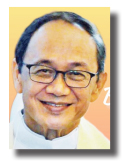
IT’S the Season of Advent again and with it we make another beginning of the liturgical year. If we truly understand the significance of the liturgy in our life, we know that we really should prepare ourselves seriously for this new beginning, having it clear in our mind what the ultimate purpose of our life is in this world.
As the Compendium of the Catechism of the Catholic Church puts it, liturgy is the “celebration of the mystery of Christ” through which the sanctification of humankind takes place. It’s a public worship offered by the whole Church as one organic body, with Christ as head and us as its members. (218) It’s a joint effort between Christ and us.
As the “sacred action par excellence”, it is therefore the “summit toward which the activity of the Church is directed and it is likewise the font from which all her power flows.” (219) The liturgy is not just a remembrance of things past. It is putting into the living present all that Christ said, did and gained for our own salvation.
With this Season of Advent, we need to develop a strong and correct sense of beginning. At the moment, many of us seem oblivious to this need. We appear to live only for the present. The past and the future are merely given a lick and a promise, that is, a shallow and fleeting consideration.
It could be because our contemporary conditions often lead us to act only for the moment. The problems and pressures of modern life badger us to mind only what is at hand at present. They tend to erode our sense of time. They seem to keep us narrow-minded, short-sighted and Pavlovian in our reactions. They trap us only in the here and now.
It’s one of the urgent challenges nowadays to develop this abiding sense of beginning. It’s what gives us a greater perspective and depth in life, a guide to help us assess things properly as we go on and encounter all sorts of situations.
We need to understand that Advent is a period of a love-filled waiting not only for the most joyous Christmas, the birth of Christ, but also and most especially of the second coming of Christ.
We need to look forward to that coming when Christ gathers us as his people at the end of time, incorporating us into his mystical body and bringing us to where we truly belong—in heaven where we, individually and collectively, will enter into a definitive communion with God, a communion of love in mind and heart.
Christ’s second coming is when we finally complete our earthly sojourn which is meant to be a time of testing, a time of making a choice either to be with God or simply to be by ourselves.
That is when we finally would become “alter Christus,” another Christ, who is the pattern and redeemer of our humanity. That is when we finally become the true image and likeness of God as God himself wanted us to be. That is when we organically form together with the others the definitive family and people of God with Christ as the head.
Even if the season of Advent is, in general, marked by a spirit of sacrifice as preparation for the coming of Christ, it also should be characterized by joy. We need to make a shout-out of this truth of our faith that true joy can only come from God, from loving him, following his will and commandments, and entering into such ever-growing intimate relationship with him that we could clearly and promptly see his abiding interventions in our life.



